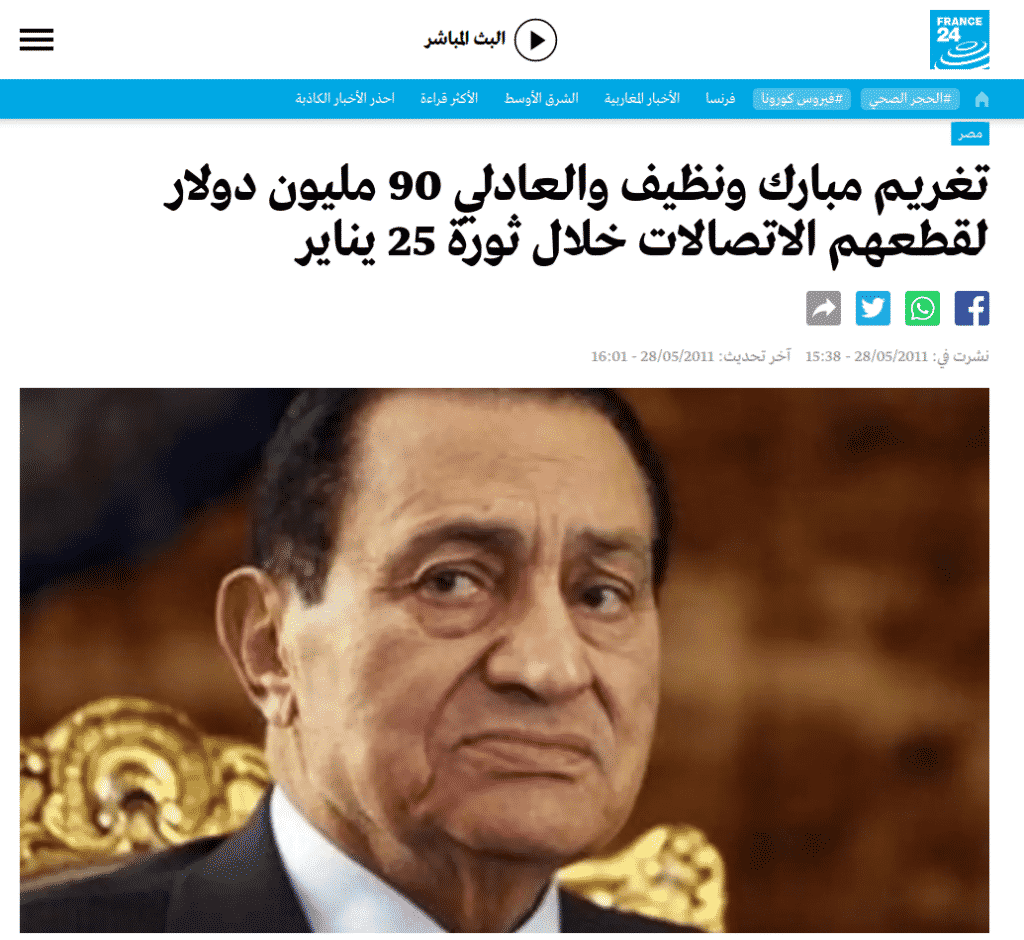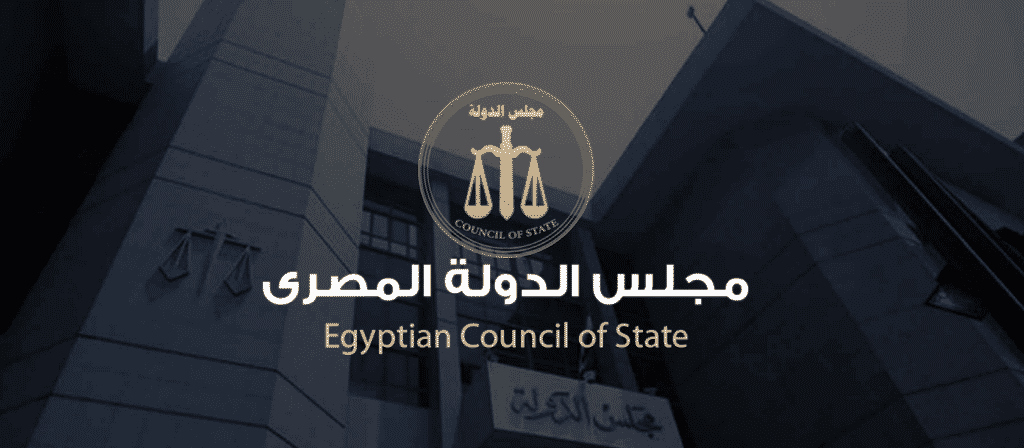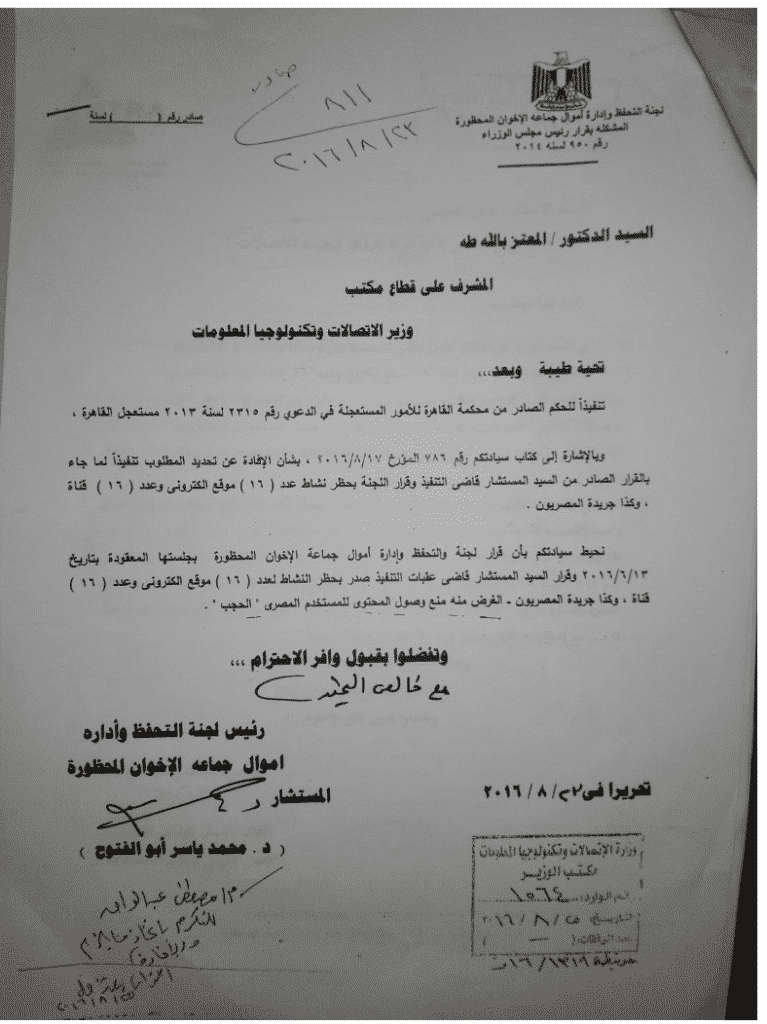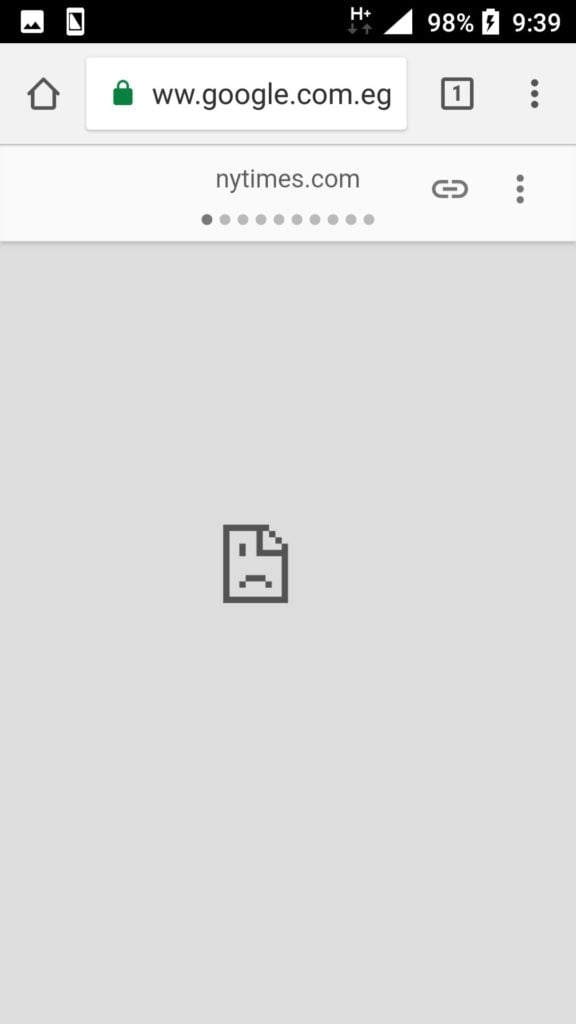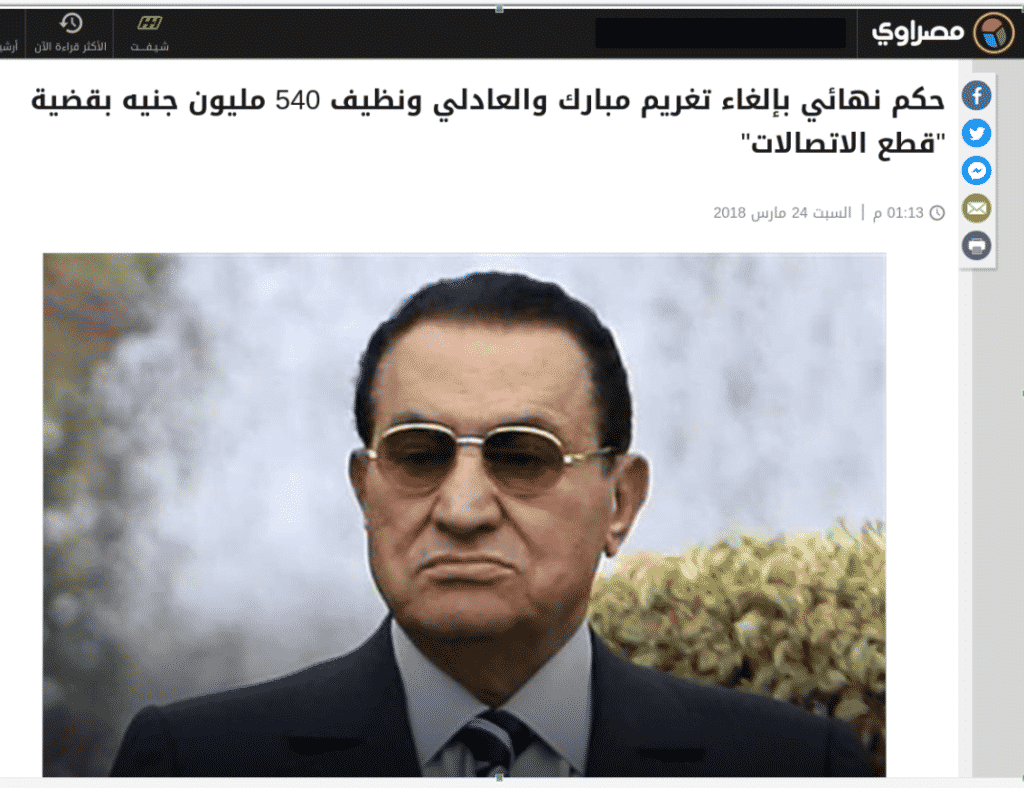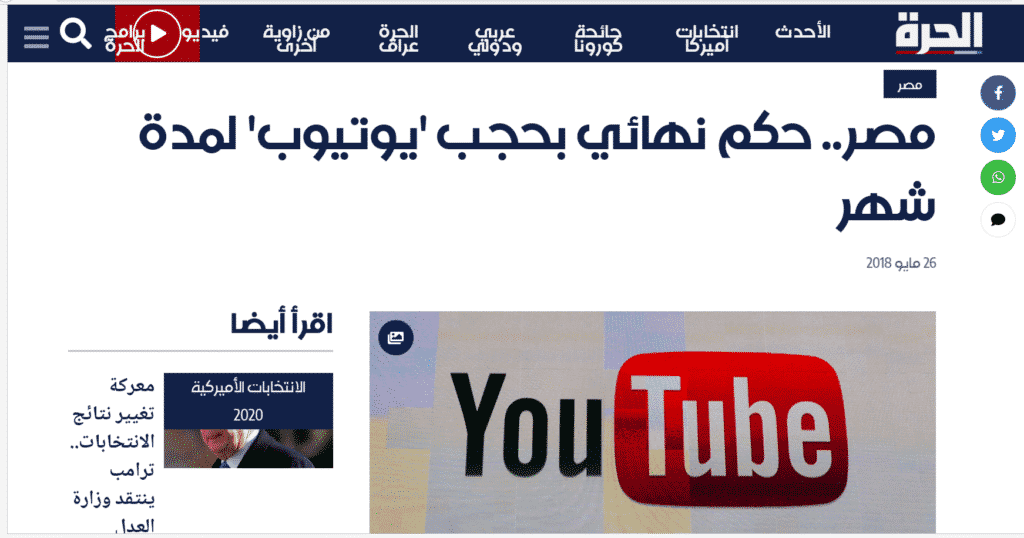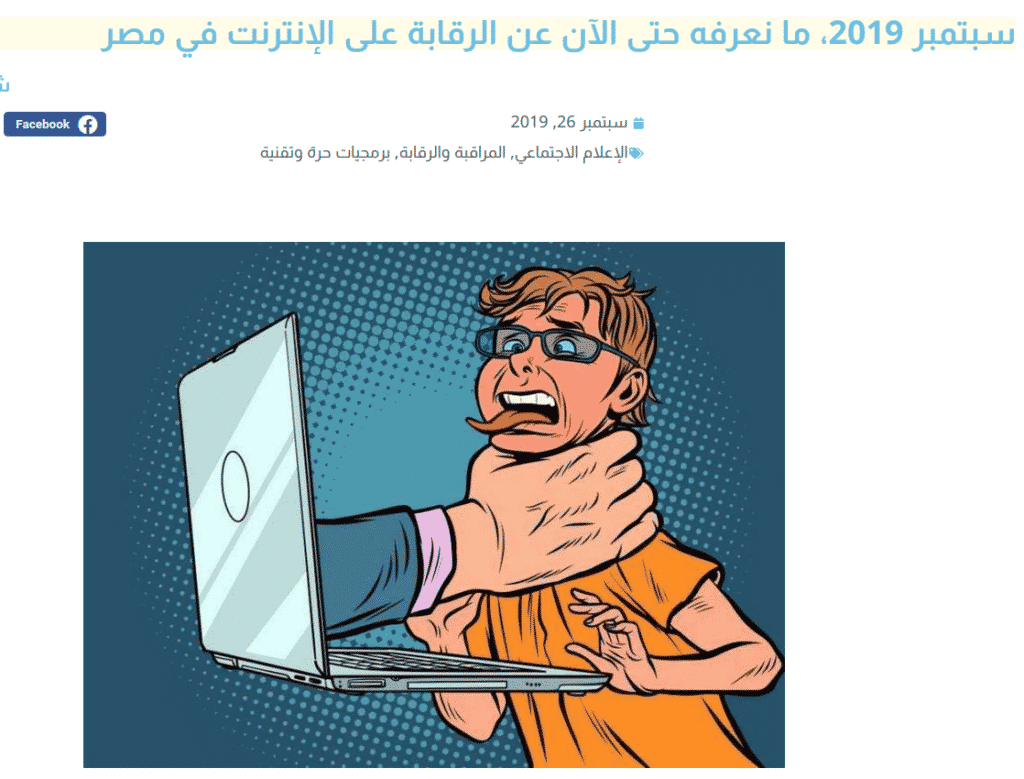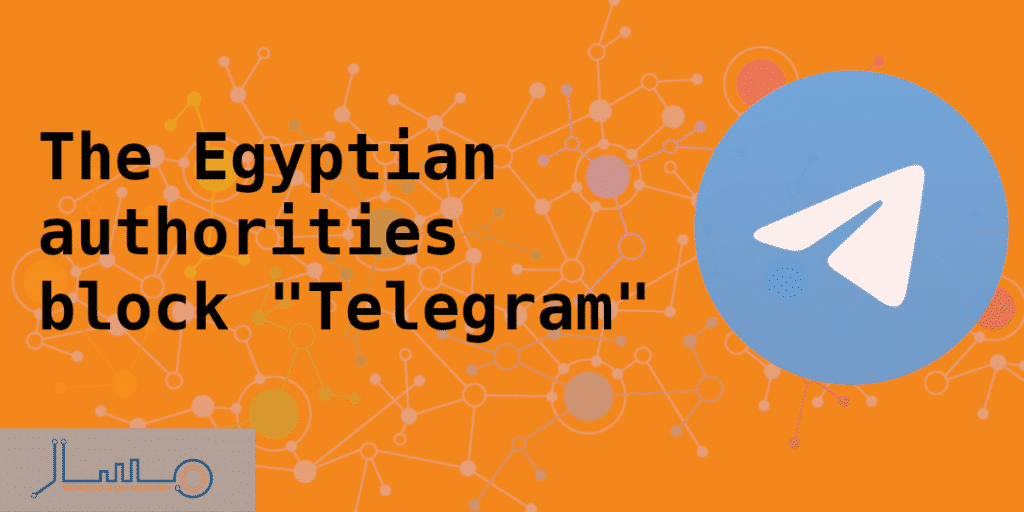This page is updated periodically
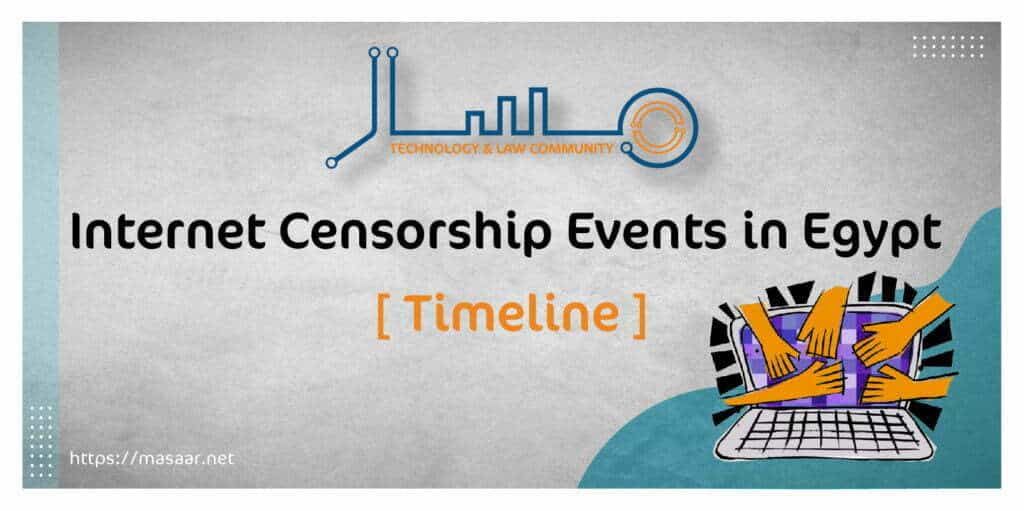
This timeline provides an overview for the most important Internet censorship events from 2010 to date. It focuses on the measures and decisions taken by the Egyptian authorities to control the Internet or prevent its users from communicating with each other through attempts to block instant messaging applications such as Signal and Wire. The timeline also presents the most important legislative developments related to the Internet and cases heard by Administrative Courts, including the blocking YouTube case and the case of cutting off communications. In addition, the timeline lists the events of Internet censorship that coincided with demonstrations in Egypt (e.g., the demonstrations of 20 September 2019).
Since the beginning of the second decade of the 2000s, and with the increase in the number of Internet users in Egypt and the consequent expansion in publishing political content critical to the authorities, through blogs and social media websites, the Egyptian authorities began to strengthen its control of the content posted on the virtual space.
In January 2011, the authorities blocked Facebook and Twitter after calls for demonstrations at Tahrir Square on 25 January 201. Blocking websites at that time was not a usual practice by the authorities, but the most prominent event of that year was the cutting of Internet and communications services all over Egypt on 28 January. Since then, the state has paid special attention to the Internet, starting by blocking websites in a systematic manner, which was followed by introducing laws to legalize the practice of blocking, such as the Anti-Cybercrime Law and the Press and Media Regulation Law.
It is only a shortcode builder. Kindly update/publish the page and check the actually cool timeline on front-end

Banning the making of telephone calls using mobile internet
The National Telecommunication Regulatory Authority (NTRA) issued a decree on 13 March 2010 banning clients of Mobinil, Vodafone, and Itisalat from making telephone calls using modems or mobile internet. The ban was basically directed against Skype application, and even though it was decreed in 2010, yet the restriction on VoIP services is still binding until now. Hence, it is not possible until this very moment to use mobile networks to make calls on Skype or WhatsApp.
Blocking Twitter and Bambuser
After calls for demonstrations at Tahrir Square on 25 January 2011 against the violence of the Ministry of Interior, the worsening of the economic conditions, and the curtailment of the freedom of expression, the government of former President Hosni Mubarak blocked Twitter and Bambuser (a video sharing application), after demonstrators used them to broadcast news and videos of the protest using the famous hashtag “#Jan25”. Twitter and Bambuser said they were blocked in Egypt, as the country’s government was trying to curtail the circulation of news on the demonstrations. The authorities also blocked a number of news websites that covered the protests: Al-Dostor and Al-Badil. And finally, the mobile phone companies were banned from providing internet services on that day in the vicinity of Al-Tahrir Square.
Blocking Facebook
On the next day -26 January 2011- Facebook was blocked for a short period of time.
Disabling mobile telephones SMS service
On 27 January 2011, the Egyptian government disabled the mobile telephones SMS service. Nobody was able to send or receive SMSs. The ban lasted until 5 February 2011.
Disconnecting internet all over Egypt
After the relative success of the 25 January 2011 demonstrations, the Egyptian political forces called for a protest on Friday 28 January (known as the Friday of Anger). The government responded by ordering the internet service providers to disconnect the internet service for all users in Egypt. The ban covered: TE Data, Vodafone, Link DSL and Itisalat Egypt for both DSL and mobile internet. The network that was left to work was Noor, then it was disconnected on 31 January. The ban continued until 2 February 2011.
Banning mobile telephone calls all over Egypt

In conjunction with internet disconnection on Friday 28 January, mobile telephone communications in general were banned. The ban included Mobinil, Vodafone, and Itisalat all over the country. The ban order was given by Habib al-Adli, the minister of interior at that time, after an urgent meeting between the three security agencies: state security, general intelligence, and military intelligence (Al-Adli himself testified to this during his trial in the case known as “the breaking out of prisons”.
Fining the president, prime minister, and minister of interior in the communications disconnection case.
On 28 May 2011, the administrative court fined former President Hosni Mubarak, former PM Ahmed Nazif, and former Minister of Interior Habib al-Adli EGP 340 million as a compensation to users who were adversely affected by the 28 January decision to cut off the internet and telephone calls. The court ruling said: “the decision to cut off communications and internet services did not aim at protecting national security, but at protecting the regime and its head. There was nothing endangering national security; nothing necessitated taking the decision to cut off communications. These were peaceful expressions of opinion by unarmed Egyptian people, calling for freedom, bread, democracy, and social justice”. (the Supreme Administrative Court cancelled this court ruling in 2018).
Lawsuit to block YouTube
Lawyer Muhammad Hamed Salem filed lawsuit number (60693/66) on 18 September 2012 to block YouTube in Egypt, because it screened a movie insulting Prophet Muhammad (according to Salem). Salem contested NTRA’s passive decision not to block YouTube, the links showing the movie, and any other movie that insult Islam.
Attempts to block Signal
On 19 December 2016, the Egyptian authorities tried to block Signal application. Users subscribing to different networks suffered some difficulties in sending and receiving messages through the application that uses end-to-end encryption. The official Twitter account of Signal said, “we have confirmed that Egypt is censoring access to Signal”.
The administrative court blocks YouTube
On 9 February 2013, Egypt’s administrative court blocked YouTube for a month and blocked all links of the movie insulting the prophet. The ruling said: “this is not freedom of expression. What is being screened represents one of the gravest forms of endangering the country’s interests and social national security”. (In 2018, the Supreme Administrative Court approved this court ruling).
Egypt’s anti-terrorism law is issued
On 15 August 2015, President Abdel-Fattah al-Sisi issued a decree ratifying law number 94 for the year 2015: The anti-terrorism law. This law allows the public prosecutor (or the investigations authority), if dealing with a terrorist crime, to order (in a reasoned decree) censoring and recording communications and calls, recording and videotaping private meetings and what goes on the internet, confiscating letters, printed materials, parcels, and telegrams in all their forms. The prosecution also has the right to block websites that publish misleading material that aim at deceiving justice.
Al-Arabi al-Jadid news website is blocked
Al-Arabi al-Jadid news website was blocked on 30 December 2015 (it was blocked at the same time in both Saudi Arabi and the United Arab Emirates).
Blocking 33 websites
The Muslim Brotherhood Financial Assets’ Confiscation and Administration Committee decreed on 13 June 2016 the blocking of 16 website, and 16 media channels. The Committee said that the aim behind the decree was to “prevent their content reaching the Egyptian user”. Among the websites included in the ban are the official website of the Muslim Brotherhood, Al-Shark, Egypt Window, Rassd, Kalimati (all news websites). The decree also ordered blocking of a number of media channels on Facebook, YouTube, and the channels’ websites (these were Al-Shark, Mekamileen, Al-Thawra).
Blocking 21 websites in Egypt
On 24 May 2017, internet users were surprisingly faced by a blocking of 21 websites, among them Al-Jazeera, Rassd, the Qatari Al-Arab newspaper, Cairo Portal, and Mada Masr. Egypt’s Middle East News Agency reported “a high-level security source” on that day saying that 21 websites were blocked. The claim was that these websites published deliberate lies that support terrorism and extremism. However, the decision taker of the blocking was not announced by the “security source”. The next day, Al-Masri al-Youm newspaper published a report whose source comes from a sovereign state body that discusses other countries’ experiences in blocking websites. The aim was to justify website blocking in Egypt.
Blocking the news website Mada Masr
On 24 May 2017, the independent news website Mada Masr was blocked in Egypt. Mada Masr’s staff published a statement on Facebook confirming news of the blocking. The statement said: “we confirmed with our technical partners that our website has been blocked. A reset packet has been injected into connections to our domain through multiple service providers”. Mada Masr promised the reader to continue providing its services despite the blocking: “Even though we would cherish a break, we will continue to publish through existing platforms, as well as our website. Look out for our coverage”. After the blocking, the website used alternative links to reach its audience. All through the past three years, most of these alternative links were also blocked. The number of blocked alternative links reached more than 25 (according to Massar’s survey). In another attempt to overcome the blocking, Mada admins also used the AMP service early in 2018. However, the service itself was blocked in February 2018.
Blocking Tor and all its subdomains
A few days after the blocking of websites, Tor browser and 8 other subdomains of Tor project were blocked. Tor was blocked after it was noticed that its users are increasing in number to overcome the governmental blocking policies. Tor is an open-source application administrated by volunteers. Its aim is to support the protection of privacy on the internet (it hides IP addresses and encrypts communications). The number of blocked websites had rose to 34 at the time Tor was blocked (Massar’s calculations).
Blocking Al-Manassa news website
On 16 June 2017, the independent news website Al-Manassa was blocked in Egypt. The website published the news: “Al-Manassa was blocked today morning inside Egypt, to be added to a list of more than 70 blocked websites in Egypt. Al-Manassa’s teamwork will continue their work challenging the blocking and will take all possible measures to keep providing their services”. The website used an alternative link to publish its content. This succeeded for nearly a year, then the website was blocked again on 29 March 2018. Al-Manassa explained this by saying it happened: “after our extended coverage of the presidential election, in which we documented a number of violations that included voter bribes and mobilization and forcing civil servants to cast their votes”. Then, on 9 April 2020, a new alternative link of Al-Manassa was blocked. The website published a statement on Facebook entitled “Why was it impossible to reach Al-Manassa website in the past days?”. It said: “the website and all of its alternative links were completely blocked”. It added: “Our journey with the blocking started three years ago since the first wave of the blocking in May and June 2017. This was followed by a number of blocking for different domains we used to provide our services to the reader. Al-Manassa vows to continue offering the reader balanced and professional journalism. We will knock all technical and legal doors to achieve this”.
Blocking 250 VPN providers
In an attempt to prevent users from reaching the blocked websites, the Egyptian authorities blocked a big number of VPN providers. 250 proxy and VPN websites were blocked on 30 August 2017. The total number of blocked websites hence reached 398 (Massar statistics). It should be noted here, that the authorities block on VPN providers continues until this very day, until the number of blockd proxy websites reached 349 (at the time of writing this report).
Blocking AMP service
On 2 February 2018, the Egyptian authorities blocked the Accelerated Mobile Pages (AMP) service in Egypt, after some websites (Mada Masr included) used it to overcome the blocking. AMP is a service provided by Google that aims at improving the performance of webpages on smartphones. This is done by enabling web publishers to increase the upload speed of their pages. Many well-known websites depend on this service, and hence its ban blocked users from reaching millions of websites. It should be noted here that on the same day of the AMP blocking, AMP website was also blocked.
Cancelling the fine in communications cut off case
After the 2011 court ruling to impose a fine in the case known as “cutting off communications during the revolution”, the Supreme Administrative Court issued a final ruling annulling the fine on President Hosni Mubarak, PM Ahmed Nazif, and Interior Minister Habib al-Adli. The court said the decree to cut off communications “came to protect national security and prevent any terrorist crimes that might happen in conjunction with the protests that the country witnessed at that time”.
The Supreme Administrative Court approves the ruling to block YouTube
On 26 May 2018, the Supreme Administrative Court issued a final ruling in the lawsuit requesting blocking YouTube. The Court approved the previous ruling to block the website for one month. The new ruling said: “the state, embodied in NATRA, should have hastened to block this insulting movie at once from YouTube and all the other websites. If this were impossible, the state should have blocked YouTube itself, and all means through which the movie could be reached, to preserve social security and peace among the Egyptian people”.
Issuing the anti-cybercrime law
On 18 August 2018, President Abdel-Fattah al-Sisi ratified the anti-information technology crimes law (known in the media as the anti-cybercrime law). The law gives the investigations authorities the powers to block websites “if there were evidence that any website, administrated from inside or outside Egypt, publishes statements, numbers, photos, movies, or any propaganda material that are criminalized by this law and that represent a threat to national security or endanger the security or economy of the country”. The law commits service providers to “store the data log register for 180 continuous days”. Among the data that should be preserved: “data that show the identity of the service user, data pertaining to the content the data log register, data pertaining to tracking the path of communication”. On 27 August, the prime minister issued the executive regulations of the law.
Issuing the press and media regulation law
Days after passing of the anti-cybercrime law, President Abdel-Fattah al-Sisi ratified the press and media regulation law (this law also regulates the formation of the Supreme Council for Media Regulation). The law gives the Council the jurisdiction to block news websites in case they had no valid license. The Council can also block any personal website, blog, or electronic account whose followers are 5,000 persons or more “if it published or broadcast false news, incited violence, hatred and disobey to the law, or called for discrimination between citizens, or approves racism and called for fanaticism or insulted individuals or represented an insult to heavenly religions or religious dogmas”. On 16 February 2020, the prime minister issued the executive regulations of the law.
Blocking Batel and 26 thousand websites
On 1 April 2019, and parallel to the constitutional amendments referendum, a campaign with the name ‘Batel’ (meaning void or invalid) was launched. The campaign aimed at collecting signatures from citizens against the constitutional amendments. After just one day Batel’s website was blocked. The campaign provided an alternative link, but it was also blocked (all the alternative links provided afterwards were blocked). In 12 days, 9 links were blocked in Egypt. And because of this ‘link hunt’, more than 26 thousand websites were blocked in Egypt, as they shared the same IP with Batel.
Blocking BBC and Al-Hurra
On 20 September 2019 a number of dispersed protests erupted in Egypt after a protest call by the contractor and actor Muhammad Ali who accused President Abdel-Fattah al-Sisi and his government of corruption. Hours before the demonstrations started the Supreme Council for Media Regulation published a report entitled “Blocking and fining are the punishments of publishing rumors in the media”. The report was a reiteration of the disciplinary measures of the Council. Article 17 of the measures ruled that the Council has the right to punish any newspaper or media outlet or electronic website that publishes or broadcasts false news or rumors, and that reported information published on the social media without verification. Article 17 sets the fine’s upper ceiling at no more than EGP 250 thousand or the equivalent in foreign currencies. The Council also has the right to ban a page, program, website for a certain period of time or permanently. Actually, some news websites were blocked in Egypt on 22 September 2010 after covering the protests. Readers found it difficult to reach certain websites like the BBC Arabic and Al-Hurra. According to the BBC, and after a phone call with Makram Muhammad Ahmed (head of the Council), Makram admitted that it is possible that the authorities had blocked some news websites including BBC Arabic. He added that he was not yet officially informed of the names of the blocked websites, however his preliminary information is that some news websites were blocked because they had published inaccurate information on the protests.
Attempts to block Wire and Facebook Messenger
The 20 September protests were followed by another call for protest on 27 September. And despite that this last call did not receive attention, yet the Egyptian government spent the whole week trying to block instant chatting applications and news websites. On 22 September, the government attempted to ban Wire instant chatting application on Vodafone. On the next day, the government attempted to block Facebook Messenger on mobile telephone networks. Messages were received by users saying, “Facebook Messenger is currently unavailable”. The Facebook Messenger website was also blocked for a limited period. Fourteen other instant chatting websites were also blocked during this period. On 24 September, the government tried to ban Twitter. On the same day technologists noticed there was a geographical blocking on Twitter and Facebook in downtown Cairo.
Banning Darb news website
On 8 March 2020, the Socialist Popular Alliance Party started Darb website (Khaled el-Balshi is the chief editor). After just one month it was blocked in Egypt. Darb is the third website in row to be blocked with Khaled as the chief editor. First the authorities blocked Al-Bedaya website in June 2017, then it blocked Kateb website after 9 hours of its launch in June 2018. It should be noted here that Kateb was an initiative empowered by the Arab Network for Human Rights Information (ANHRI) whose website was also blocked in August 2017. The Popular Alliance party and Darb staff issued a statement entitled “We will continue our work and will take the needed legal measures”. The statement said: “despite the blocking whose source and reason are not known, the website will continue working with the same editorial policies, as a platform for exchange of information and broadcast of ideas, reflecting the views of the democratic forces with all their variations”. The statement said all measures will be taken against this “oppressive decision”. It ended by: “blocking opinions and censoring the press do not protect the motherland”.
Blocking Telegram
On 22 October 2020, Telegram application and website were blocked for a limited period in Egypt on three networks (We, Vodafone and Orange). Several of Telegram users announced they cannot reach it. Telegram is a very famous and widely used applications.








